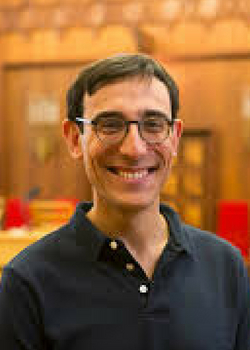This Shabbat marks a new beginning, as we open a fresh book of the Humash, Sefer Vayikra/the Book of Leviticus, for our weekly Torah reading. Along with pushing ahead in our annual progression through our Torah scroll this week, we'll hear from a second Torah as well. Our Maftir portion for this Shabbat is Parashat Zachor – literally the "Parashah of Memory" – read every year on the Shabbat before Purim.
In Deuteronomy 25:17-19, Moses commands our ancestors, standing at the precipice of the Promised Land, to remember a vicious attack they faced in their first days of freedom from Egypt. He also orders them to eventually track down these attackers, and exact revenge once they are settled in the land of Israel. B'nai Yisrael are commanded to both blot out the memory of these villains, and also, to never forget them. We fulfill this command as well. According to the tradition, we read the words of Parashat Zachor on the eve of Purim, so that over the coming week we'll preserve the memory of two moments of national peril – one in the wilderness of Sinai and the second in the Persian Imperial Court.
And yet, in reviewing these few verses of our Maftir, I was struck by the ambiguity of one particular clause in verse 18:
"(Remember) how he fell upon you on the way, and cut down all the stragglers, when you were faint and weary, and feared not God."
Like most Biblical passages, this verse isn't quite as clear as we might like – particularly in its pronouns. Certainly, the "he" who fell upon us is Amalek, and we, B'nai Yisrael, are the "you" who were faint and weary, but who are we meant to identify at the end of the verse, when we are told that someone "feared not God?"
Rashi – our tradition's Biblical commentator par excellence - gives us the straightforward answer: The one who "did not fear God" is of course Amalek, "who had no fear of God that might have prevented them from doing evil." God-fearing people, Rashi teaches us, don't attack the weakest members of a nation, especially one that just escaped from brutal slavery. Clearly, he explains, the group that "does not fear God" in this verse must be Amalek.
But Hizkuni, a 13th Century, French Biblical exegete, takes a less straightforward path to explaining our Maftir. For him, the group that "did not fear God" is actually us, the people of Israel. Somehow, OUR lack of concern for the Divine made us vulnerable to attack at this moment.
At first glance, Hizkuni's explanation seems to be based on a deeply troubling theology, one that assumes that those without proper faith in God deserve Divine retribution, or at least punishment meted out by fellow humans. Perhaps, however, if we read Hizkuni more closely, what he proposes might be something else entirely. Might he instead be suggesting that we also failed, as a people, at this historic moment? Did the strongest amongst us somehow allow a "weak and weary" portion of our camp to be subject to attack – by ignoring them? Had we had "greater faith," had we better understood that all of the members of our community were created in God's image, might we have kept a closer eye on our weakest coreligionists, protecting them from Amalek's marauding bands? Did we lose faith in God in those first days in the wilderness, and fail to care for one another, leaving our community vulnerable to the dangers of desert life?
According to this reading of the Hizkuni, what Parashat Zachor commands us to remember is that faith in God is really all about care for one another. In fact, that kind of faith is a major element of our Purim observance as well. At the end of the Megillah, after we have been saved by Esther's cunning from Haman's plot to destroy our people, Mordechai establishes the new holiday of Purim to celebrate our salvation, and he tells our ancestors: "Make these days of feasting and of gladness, of sending portions one to another, and gifts to the poor." (Esther 9:22) We celebrate salvation, Mordechai teaches, and we prove our enduring faith in God, by sharing our finest food with our friends and neighbors and also by sharing our plenty with those in need. Faith in God, means treating all members of our community as worthy of God's love, and also worthy of our love.
On this Shabbat Zachor, let us be blessed with the memory of a faith in God that does not waiver. A faith in God that directs us to see the spark of the Divine in our dearest friends and in the humblest and poorest of God's creatures too. Let us prove our faith in acts of love for one another, and in our coming together in celebration, and as one united community, on the holiday of Purim.
Shabbat Shalom

